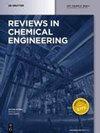Trends and perspectives in deterministic MINLP optimization for integrated planning, scheduling, control, and design of chemical processes
IF 6.6
3区 工程技术
Q1 ENGINEERING, CHEMICAL
引用次数: 0
Abstract
Mixed integer nonlinear programming (MINLP) in chemical engineering originated as a tool for solving optimal process synthesis and design problems. Since then, the application of MINLP has expanded to encompass control and operational decisions that are in line with the arising challenges faced by the industry, e.g., sustainability, competitive markets, and volatile supply chain environments. Nowadays, process plants are transitioning from traditional manufacturing practices to automated solutions able to integrate decision-making within manufacturing enterprises. This paradigm shift aims to increase profits, optimize resource utilization efficiency, promote long-term sustainability, minimize waste, and enhance responsiveness under uncertainties and perturbations. Accordingly, the development of reliable, computationally efficient, and robust MINLP algorithms capable of simultaneously handling process design, planning, scheduling, or control decisions are crucial to achieving Industry 4.0 integration goals. This work explores potential research opportunities and recent advances toward the development of integrated decision-making frameworks, focusing on their underlying state-of-the-art optimization tools. We provide an overview of emerging deterministic MINLP optimization algorithms for simultaneous decision-making problems. Furthermore, we constructively discuss the versatility and limitations of these optimization tools. We also highlight how novel optimization theories, both within and outside the chemical engineering domain, can be incorporated into advanced MINLP frameworks suitable for process integration.化学过程综合规划、调度、控制和设计的确定性MINLP优化的趋势和前景
混合整数非线性规划(MINLP)是化工领域的一种解决最优工艺综合和设计问题的工具。从那时起,MINLP的应用已经扩展到包括控制和运营决策,以应对行业面临的挑战,例如可持续性、竞争激烈的市场和不稳定的供应链环境。如今,加工工厂正在从传统的制造实践过渡到能够在制造企业中集成决策的自动化解决方案。这种模式的转变旨在增加利润,优化资源利用效率,促进长期可持续性,最大限度地减少浪费,并提高对不确定性和扰动的响应能力。因此,开发能够同时处理流程设计、规划、调度或控制决策的可靠、计算效率高且稳健的MINLP算法对于实现工业4.0集成目标至关重要。这项工作探讨了潜在的研究机会和综合决策框架发展的最新进展,重点是其潜在的最先进的优化工具。我们提供了新兴的确定性MINLP优化算法的同时决策问题的概述。此外,我们建设性地讨论了这些优化工具的通用性和局限性。我们还强调了如何将化学工程领域内外的新优化理论纳入适合过程集成的先进MINLP框架。
本文章由计算机程序翻译,如有差异,请以英文原文为准。
求助全文
约1分钟内获得全文
求助全文
来源期刊

Reviews in Chemical Engineering
工程技术-工程:化工
CiteScore
12.30
自引率
0.00%
发文量
37
审稿时长
6 months
期刊介绍:
Reviews in Chemical Engineering publishes authoritative review articles on all aspects of the broad field of chemical engineering and applied chemistry. Its aim is to develop new insights and understanding and to promote interest and research activity in chemical engineering, as well as the application of new developments in these areas. The bimonthly journal publishes peer-reviewed articles by leading chemical engineers, applied scientists and mathematicians. The broad interest today in solutions through chemistry to some of the world’s most challenging problems ensures that Reviews in Chemical Engineering will play a significant role in the growth of the field as a whole.
 求助内容:
求助内容: 应助结果提醒方式:
应助结果提醒方式:


